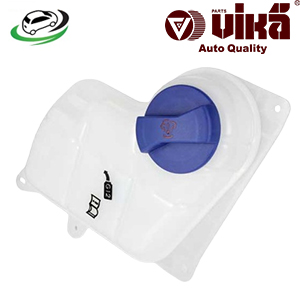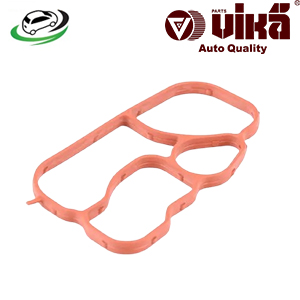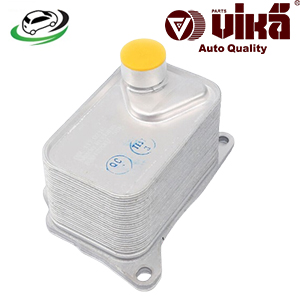-9%
Get Engine Oil Cooler AUDI A1/A3/A4/A5/A6/Q2/Q3/Q7/Tt Roadster / VW Arteon/Beetle/Golf/Passat/Polo/Scirocco 06L117021C
An engine oil cooler is an essential component in many vehicles, particularly those with high-performance or heavy-duty engines. Its primary function is to regulate the temperature of the engine oil, ensuring that it remains within the optimal range for proper lubrication and engine protection. In this comprehensive overview, we’ll explore the design, function, importance, types, benefits, maintenance, and potential issues related to engine oil coolers.
Design and Location
The engine oil cooler is typically a small radiator-like device, consisting of a series of tubes or plates through which the engine oil flows. As the oil passes through these tubes or plates, it releases heat, which is then dissipated by the airflow over the cooler’s surface. The design may vary depending on the type of cooler, but the principle remains the same: maximizing the surface area exposed to cooling air or coolant to efficiently reduce the oil temperature.
The oil cooler is usually mounted in a location where it can receive adequate airflow, such as at the front of the vehicle, near the radiator or in the engine bay. Some oil coolers are integrated with the vehicle’s main radiator, while others are standalone units.
Functionality
The primary function of an engine oil cooler is to maintain the oil at an optimal temperature, preventing it from becoming too hot or too cold. Engine oil serves several critical functions, including lubricating moving parts, reducing friction, and carrying away heat from the engine. However, as the engine runs, the oil itself can become very hot, especially under heavy loads or high-performance conditions. If the oil becomes too hot, it can lose its viscosity, leading to reduced lubrication and potential engine damage.
Here’s how the engine oil cooler works:
- Oil Circulation: The engine oil is pumped through the engine, where it absorbs heat from the engine’s moving parts. This heated oil is then directed to the oil cooler.
- Heat Dissipation: As the oil passes through the cooler, it is exposed to cooler air or coolant, depending on the type of cooler. This process dissipates the heat absorbed by the oil, lowering its temperature.
- Return to Engine: The cooled oil is then returned to the engine, where it continues to perform its lubricating and cooling functions.
Importance of an Engine Oil Cooler
The engine oil cooler is crucial for maintaining the overall health and efficiency of an engine. Here’s why it’s so important:
- Preventing Overheating: By regulating the oil temperature, the oil cooler helps prevent the engine from overheating. Overheated oil can break down, leading to a loss of lubrication and increased friction between engine components. This can cause excessive wear, engine knocking, and even catastrophic engine failure.
- Maintaining Oil Viscosity: Engine oil needs to maintain a certain viscosity to effectively lubricate engine components. If the oil gets too hot, it can become too thin, reducing its ability to protect the engine. The oil cooler ensures that the oil remains within the optimal temperature range, preserving its viscosity and lubricating properties.
- Enhancing Engine Performance: A cooler running engine is generally more efficient and performs better. By keeping the oil temperature in check, the oil cooler helps the engine run more smoothly, reducing wear and tear and potentially improving fuel efficiency.
- Supporting High-Performance Engines: High-performance and heavy-duty engines generate more heat due to higher power outputs. An oil cooler is especially important in these engines, as it helps manage the increased thermal load and prevents oil breakdown under extreme conditions.
Types of Engine Oil Coolers
There are several types of engine oil coolers, each with its own design and method of cooling the oil:
- Air-to-Oil Coolers:
- Design: These coolers are similar to small radiators, where engine oil flows through a series of tubes or fins. Air passing over these fins cools the oil.
- Application: Air-to-oil coolers are commonly used in performance vehicles and motorcycles, where space is limited, and air cooling is sufficient.
- Water-to-Oil Coolers:
- Design: These coolers use the engine’s coolant to cool the oil. The oil flows through a heat exchanger where it is cooled by the engine coolant, which is itself cooled by the radiator.
- Application: Water-to-oil coolers are often used in heavy-duty vehicles, trucks, and high-performance cars, where more efficient cooling is required.
- Remote Oil Coolers:
- Design: These are typically air-to-oil coolers that are mounted away from the engine, often in a location with better airflow.
- Application: Remote oil coolers are used when space constraints or design considerations require the cooler to be placed in a different location from the engine.
- Integrated Oil Coolers:
- Design: Some vehicles have oil coolers integrated into the engine’s oil filter housing or radiator.
- Application: Integrated oil coolers are common in many modern vehicles as they are compact and efficient.
Benefits of an Engine Oil Cooler
An engine oil cooler offers several benefits that contribute to the overall performance and longevity of the engine:
- Extended Engine Life: By maintaining proper oil temperature and viscosity, the oil cooler helps reduce engine wear and extend its lifespan.
- Improved Performance: Cooler oil allows the engine to perform more efficiently, with better power output and potentially improved fuel economy.
- Enhanced Reliability: In high-stress conditions, such as towing, racing, or hot climates, an oil cooler provides additional protection against overheating and oil breakdown.
- Protection in Extreme Conditions: Whether it’s extreme heat or high-performance driving, an oil cooler ensures that the engine oil can handle the demands placed on it without compromising engine protection.
Maintenance and Troubleshooting
Maintaining the engine oil cooler is vital for ensuring it continues to function effectively. Here are some maintenance tips and common issues to be aware of:
- Regular Inspection: Periodically check the oil cooler for signs of damage, such as bent fins, leaks, or corrosion. Any physical damage can reduce the cooler’s effectiveness.
- Cleanliness: Ensure the oil cooler is free of debris, such as dirt, leaves, or insects, which can block airflow and reduce cooling efficiency. Regularly clean the cooler, especially if driving in dusty or dirty environments.
- Oil and Filter Changes: Regularly changing the engine oil and filter helps prevent contaminants from building up in the oil cooler, which could lead to blockages or reduced cooling efficiency.
- Check for Leaks: Oil leaks from the cooler or its connections can lead to low oil levels and reduced cooling performance. If you notice any oil leaks, address them immediately.
- Monitor Oil Temperature: Keep an eye on the oil temperature gauge if your vehicle is equipped with one. A sudden rise in oil temperature could indicate a problem with the oil cooler or a related component.
Common Issues with Engine Oil Coolers
While engine oil coolers are generally reliable, they can experience issues, particularly if not properly maintained:
- Leaks: Oil leaks are a common issue, often caused by damaged hoses, seals, or fittings. Leaks can lead to low oil levels, which reduces the effectiveness of the cooling system and can cause engine damage.
- Blockages: Contaminants in the oil can cause blockages in the cooler’s tubes or fins, reducing its ability to dissipate heat. This can lead to overheating and reduced engine performance.
- Corrosion: Over time, exposure to moisture and road salts can cause the oil cooler to corrode, particularly in older vehicles or those driven in harsh conditions. Corrosion can lead to leaks or structural failure.
- Airflow Restriction: If the oil cooler is mounted in a location where airflow is restricted, such as behind a blocked grille, it may not function effectively. This can lead to higher oil temperatures and potential engine overheating.
Follow us on Facebook for more parts.



